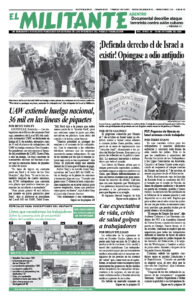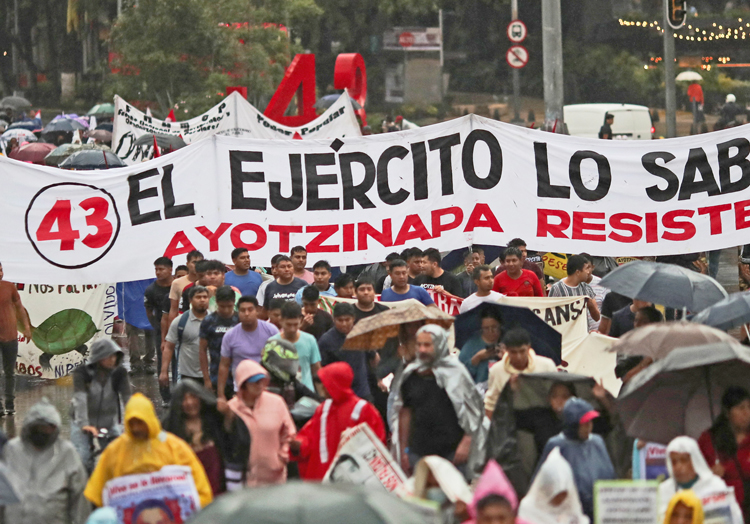For decades working people in Mexico have faced governments defending capitalist exploitation, widespread corruption, drug cartels and police repression. Five years ago, many voted for and looked to new President Andrés Manuel López Obrador, hoping his promises would reverse previous administrations’ policies that devastated working people and bring back the “rule of law.”
With eight months to go until he has to step down after Mexico’s presidential elections next year, López Obrador still commands relatively high approval ratings. At the same time, there is deepening social and political polarization amid a slow-growing economy and unabated violent crime.
AMLO, as López Obrador is commonly known, argues his government stands in continuity with the great national milestones in Mexico’s development, including the 1810-21 war of independence from Spain and the Mexican Revolution of 1910-20. But far from representing a change, the measures he has advanced defend the rule of capital.
His administration has taken steps he claims will benefit working people. Some of these have won support, including an increase in the minimum wage.
It rose last January to 207 pesos a day ($11.45). In southern Mexico coconut seller Carmelo Morrugares told the Los Angeles Times his wage doubled as a result of minimum-wage hikes. In Salina Cruz, salt miner Carlos Estrada says his family now eats meat once every two weeks instead of every two months.
For workers in the “free northern border zone” — where massive foreign export manufacturing operations have set up shop — wages will rise to 312 pesos.
But that minimum wage far from covers necessities for working-class families and does not apply to the immense majority of the population employed in the so-called informal economy.
Also popular are cash transfer programs for elderly workers who aren’t covered under the national security system, as well as scholarships for students and payments for small farmers through reforestation programs.
Many of these programs have been set up by redirecting funds from previous social measures, or by simply changing their names.
A program started in 2008 provided 3.6 million students with extended after-school programs and hot meals. It was put on the chopping block in early 2022. Tens of thousands of working-class families were affected, especially those headed by single mothers who had to give up working to look after their children. Instead, cash payments are now being given directly to individual families and to parents associations.
Vowing to do away with corruption — which has been the source of much of the hatred by working people in Mexico toward the Institutional Revolutionary Party (PRI) and other traditional capitalist parties — AMLO has strengthened the powers of the presidency and the control of his party, the National Regeneration Movement (Morena), over government institutions.
Corruption is endemic to capitalism and flourishes under AMLO’s watch. Only its beneficiaries have shifted.
Keeping with a practice of past administrations, multi-million-dollar infrastructure projects and funding for public institutions have been initiated. For a new national airport on the outskirts of Mexico City and a high-speed train in the Yucatán Peninsula, there were virtually no rival bids for the contracts and details of the outlays were kept hidden under the pretext of “national security.”
López Obrador has defended the army brass as “incorruptible,” an assertion that flies in the face of what most Mexicans know. In the name of stamping out corruption, he replaced the federal police in September 2022 with a 115,000-strong National Guard, headed by army commanders.
His administration has continued protecting high-ranking army and police officers connected to the 2014 killing and disappearance of 43 students from the Ayotzinapa teachers college. But relatives of the slain remain determined to uncover what happened.
Containing workers’ struggles
Behind radical-sounding statements, López Obrador hides his commitment to uphold capitalist exploitation, which is to blame for the conditions affecting tens of millions in city and countryside. He seeks to contain struggles by working people by fostering dependence on state patronage through his political party.
As part of efforts to increase Mexico´s energy production, his government has revived small-scale coal operations, known as “pocitos” (little wells), in the northern border state of Coahuila.
There are hundreds of these small mines operating with dangerous conditions and no unions. Under a plan “to give more income to the poorest Mexicans,” they sell their coal to the Federal Electricity Commission, headed by Manuel Bartlett, an old-guard politician, who like AMLO was formerly a member of the PRI, and the Party of the Democratic Revolution.
“It’s the same model from 30 years ago under the PRI. … It’s the same names, some of them now belong to Morena,” said Cristina Auerbach, director of Pasta de Conchos Families, on the program “Sin Embargo al Aire” on Aug. 4, 2022. The group is fighting for compensation for the families of 65 miners killed in a mine disaster in 2006, and for their bodies to be recovered. “How can you have ‘energy sovereignty’ at the cost of people’s lives?” she said.
AMLO’s administration harks back to the heyday of the PRI, which held power uninterruptedly for most of the 20th century, rather than the “profound and radical” change he claims to offer.
That PRI-dominated period was marked by the party’s near absolute control of the political system, and the co-opting of labor unions and peasant organizations. PRI governments used a combination of reforms and repression to maintain capitalist stability.
In the meantime, Mexican and foreign capitalists continue to syphon off billions of dollars in profits from the labor of Mexican workers.
These conditions are pushing some to look for ways to fight. Earlier this year VW and Audi workers won wage raises after threatening labor actions. In May last year workers at the GM Silao plant in the state of Guanajuato also won a wage increase.
These actions point toward workers relying on their own power and that of their unions, not continuing dependence on government patronage handed out by the country’s capitalist parties.


